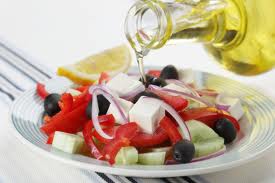The problem with so many diets—especially the ones with catch names—is that the guidelines are so vague that it’s almost impossible to actually follow them.  Saying “eat more fish” or “cut back on carbs” sounds nice, but what does it mean? How much fish? How much carbs? A team of researchers has just come up with answers to those and many more about the Mediterranean Diet.
Saying “eat more fish” or “cut back on carbs” sounds nice, but what does it mean? How much fish? How much carbs? A team of researchers has just come up with answers to those and many more about the Mediterranean Diet.
Here’s the daily diet they suggest:
• Dairy products: 165 g for men and 200 g for women
• Fruit: 140 g for men and 125 g for women
• Vegetables: 125 g for men and 140 for women
• Cereals: 130 g for men and 125 g for women
• Meat: 70 g for men and women
• Fish: 20 g for men and 25 g for women
• Legumes: 10 g for men and women
The benefits of following the diet are pretty impressive. According to Francesco Sofi, MD, PhD, of the University of Florence, a two-point increase of adherence score to Mediterranean diet showed a 9% reduction of overall mortality, an 11% reduced risk of cardiovascular disease, and a 5% reduction of neoplastic disease.
Sufi’s team didn’t spend a lot of time tracking data on olive oil, nuts, and wine, which are some of the most important components of the Mediterranean diet. But another researcher, Antonia Trichopoulou, MD, PhD, of the University of Athens, did. She and her team tried to find out which ingredients of the Mediterranean actually produced the most health benefits. They found that nearly 25% of the health benefits could be attributed to moderate alcohol consumption. Seventeen percent came from eating moderate or low amounts of meat, 11% from getting lots of veggies, another 11% from fruits and nuts, and yet another 11% from olive oil (which helps get the ratio of good fats (monounsaturated) to bad fats (saturated) where it needs to be.



